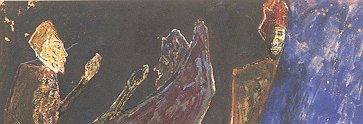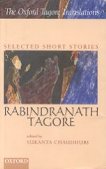

# The Forgotten Stone: On Rabindranath Tagore and Latin America (essay)

|
Selected Short Stories of Rabindranath
Tagore
ed. Sukanta Chaudhuri, Oxford, Pp:322, ISBN: 123-456-7890 Rajat Chanda
Rabindranath wrote most of his short
stories in the 1890s. They were published in several
periodicals,
most notably, Sadhana where 36 of his stories appeared.
Literary
magazines played a critical role in the development of Bengali literature throughout
the 19th
and the first few decades of the 20th century. Rabindranath
directed and edited Sadhana and published many of his best known
stories,
including Kabuliwala (kaabulioYaalaa) and Hungry Stone (kShudhita paashhaaN), in the pages of this
remarkable
periodical. Later, during 1914-1917, several of his great stories
like The Wife's Letter (strIr patra) and Woman Unknown (aparichitaa) appeared
in the
monthly magazine Sabuj Patra.
Some of Rabindranath's short stories
received
strong criticism when they first appeared. The non-Bengali readers
had
to rely on translations, many of which were of poor quality. Thus,
his
genius as a short story writer was not recognized for
years.
Mary Lago in her work Imperfect Encounter searched for the reasons for
these
unsatisfactory translations. C. F. Andrews managed Tagore's
relations
with the English publishers rather badly, interposing himself
between the
author and potential competent translators, and turning off several of
them
in the process. Andrews had rather limited literary sensibilities
but enjoyed
a great deal of Tagore's confidence. He contributed a number of
unsuccessful
translations; some of them done in collaboration with the author. He also
insisted
on modifying and westernizing the stories to suit western
taste.
Rabindranath himself weakened some of his
powerful
stories in translation by leaving out details of Indian
life that he thought would be
too foreign to non-Indian readers.
Edward
Thompson was
an English poet and critic having long association with Rabindranath
and
a number of other luminaries of Bengali culture such as
the philosopher Brojendranath Seal, the artist Abanindranath Tagore, and Prasanta
Mahalanobis, the
scientist.
Thompson wrote in Tagore's obituary in 1941:
"More
and more he toned down or omitted whatever seemed to him
characteristically
Indian, which very often was what was gripping and powerful.
He
despaired
too much of ever persuading our people to be interested in what was
strange
to them. His work will one day have to be retranslated and properly
edited.
I am sure that then there will be a revival of his
reputation."
About a decade ago W. Radice's Selected
Short
Stories with an excellent introduction was published. It
focussed
only on Tagore's stories written in the 1890s. This followed his
remarkable
translations of Tagore's Selected Poems. These works indeed helped
revive
Tagore's reputation outside India.
The elegantly produced recent publication,
also
titled Selected Short Stories, is edited by Sukanta Chaudhuri.
Sankha Ghosh,
the noted scholar and writer, is the advisory editor who helped
select
the stories. This work attempts to capture the whole range of
Rabindranath's
short stories by selecting 26 of them, starting from The Ghat's
Story (ghaaTer kathaa), written
in his early 20's and beautifully translated by Supriya Chaudhuri, to
The
Laboratory (lyaabareTari), a remarkable story written in the last year of his life
and
The Story of a Mussalmani (musalamaanir galpa), first published years after his
death.
It may be mentioned that 6 of these stories, The
Exercise-Book (khaataa), A
Single Night (ekaraatri), The Living and the Dead (jIbita o mR^ita), Kabuliwala (kaabilioYaalaa), Grandfather (Thaakuradaa), and
Hungry
Stone (kShudhita paashhaaN), are also to be found in Radice's
selection.
This volume is the first in a series called The
Oxford
Tagore Translations, a major project undertaken by the Oxford
University
Press in collaboration with Viswa-Bharati. The future volumes will
include
Selected Poems, Tagore's writings on Literature and Language, and
writings
for children.
A distinguished panel of translators has
managed
to convey the delicate beauty of the original. Many of the stories
reflect
Tagore's rural experiences, his love of nature, and his deep
insight into
human relationships. It is indeed a pleasure to come across such
uniform
and high quality of translations of these treasures of
Bengali
literature. In most of these stories, universal themes transcend
regional and
cultural barriers.
The introduction by Tapobrata Ghosh
provides an
excellent overview, background and the context of the stories. The
notes
at the end of the book, also prepared by Tapobrata Ghosh, are short
and
to the point. These notes provide keys to Bengali culture and
customs.
 Finally, reproductions of appropriate sketches and paintings by Tagore himself and by his nephew, the famous artist Gaganendranath Tagore, have helped set the mood and greatly enhanced the artistic quality of the production.
In summary, editor Sukanta Chaudhuri and
the entire
panel of translators must be congratulated for an excellent effort.
Tagore's
creations were obscured and partly forgotten for so long mainly due
to
inadequate translations of his writings. We hope that the future
volumes
of the Oxford Tagore Translations series will maintain the high
standards
set in this volume and will re-introduce to the world the
multi-faceted
genius of Tagore, perhaps the greatest Indian writer
ever.
You can buy this book online at Amazon.Com
Further Reading: Click here to send your feedback
|

.
 Rabindranath Tagore wrote almost 100 short stories. He was the first
Bengali
writer to elevate the short story to a serious art-form. Tagore easily intermingled stark realism and poetic idealism in his stories which reflected the contemporary life in rural and urban Bengal. Many of
the stories portray conflicts or tensions between the new and the old,
cruelty
and sensitivity, solitude and crowd, male and
female.
Rabindranath Tagore wrote almost 100 short stories. He was the first
Bengali
writer to elevate the short story to a serious art-form. Tagore easily intermingled stark realism and poetic idealism in his stories which reflected the contemporary life in rural and urban Bengal. Many of
the stories portray conflicts or tensions between the new and the old,
cruelty
and sensitivity, solitude and crowd, male and
female.